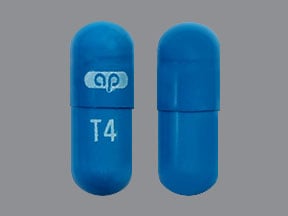
Detrol La Coupons & Savings Card – Discount Prices from $36.00
Brand for: Tolterodine er
My prescription
Edit
4MG, Tolterodine ER (90 Capsule Extended Release 24 Hours)
Select pharmacy

CVS
$36.00
COUPON PRICE
Albertsons
$40.79
COUPON PRICE
Walmart
$44.81
COUPON PRICE
Walgreens
$45.09
COUPON PRICEDetrol La savings card
Show this card to your pharmacist
CVS
$36.00
BIN
ID
PCN
GRP
019876
LH95A53FCA
CHIPPO
LHX
Powered by
More prescriptions for overactive bladder
More prescriptions for overactive bladder
Detrol La (Tolterodine ER) dosage forms
Dosage Quantity Price from Per unit 2MG 1 Capsule Extended Release 24 Hour $2.94 $2.94 2MG 30 Capsule Extended Release 24 Hours $15.63 $0.52 2MG 90 Capsule Extended Release 24 Hours $36.00 $0.40 2MG 500 Capsule Extended Release 24 Hours $80.20 $0.16 4MG 90 Capsule Extended Release 24 Hours $36.00 $0.40 4MG 1 Capsule Extended Release 24 Hour $2.90 $2.90 4MG 30 Capsule Extended Release 24 Hours $14.44 $0.48 4MG 500 Capsule Extended Release 24 Hours $80.20 $0.16
| Dosage | Quantity | Price from | Per unit |
|---|---|---|---|
| 2MG | 1 Capsule Extended Release 24 Hour | $2.94 | $2.94 |
| 2MG | 30 Capsule Extended Release 24 Hours | $15.63 | $0.52 |
| 2MG | 90 Capsule Extended Release 24 Hours | $36.00 | $0.40 |
| 2MG | 500 Capsule Extended Release 24 Hours | $80.20 | $0.16 |
| 4MG | 90 Capsule Extended Release 24 Hours | $36.00 | $0.40 |
| 4MG | 1 Capsule Extended Release 24 Hour | $2.90 | $2.90 |
| 4MG | 30 Capsule Extended Release 24 Hours | $14.44 | $0.48 |
| 4MG | 500 Capsule Extended Release 24 Hours | $80.20 | $0.16 |
Who should not take Detrol LA?
Detrol LA should not be taken by individuals who have urinary retention, gastric retention, or uncontrolled narrow-angle glaucoma. Additionally, it is contraindicated in those with a known hypersensitivity to tolterodine or any of its ingredients. It is important for patients to consult with their healthcare provider to determine if Detrol LA is appropriate for their condition.
What does Detrol LA do?
Detrol LA is a medication used to treat overactive bladder symptoms, such as frequent or urgent urination and urinary incontinence. It works by relaxing the bladder muscles to help reduce these symptoms.
Using the SaveHealth discount card, what is the price of Detrol La without insurance?
Using the SaveHealth discount card, the price of Detrol La without insurance is $36.00.
What is the price of Detrol La at CVS?
The price of Detrol La at CVS is $36.00.
What is the price of Detrol La at Walgreens?
The price of Detrol La at Walgreens is $45.09.
What is the price of Detrol La at Walmart?
The price of Detrol La at Walmart is $44.81.
